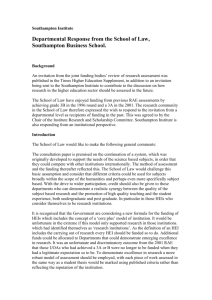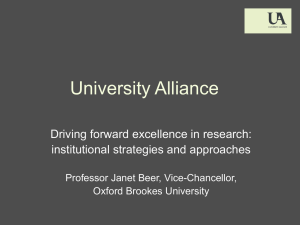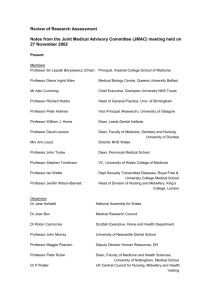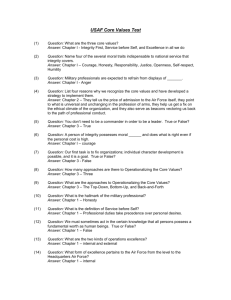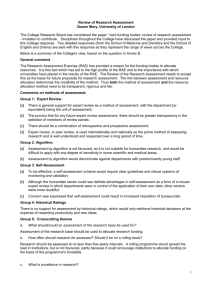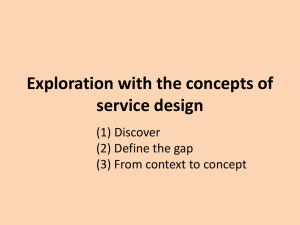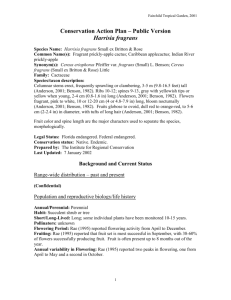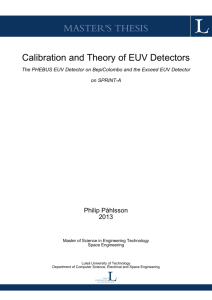General Comments
advertisement
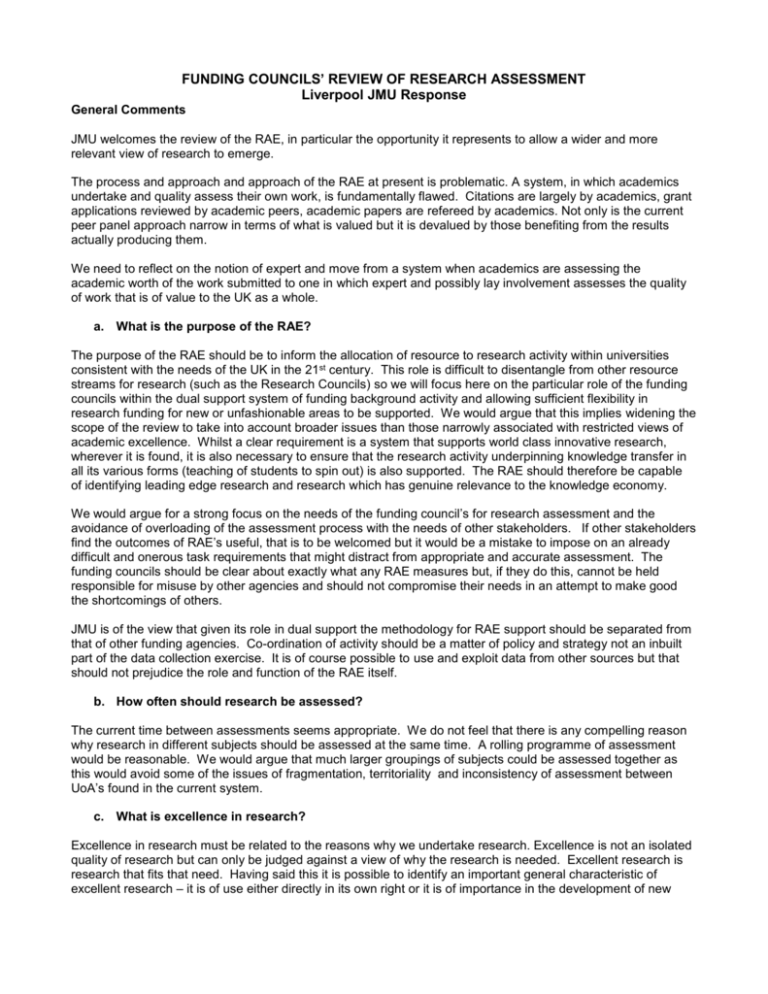
FUNDING COUNCILS’ REVIEW OF RESEARCH ASSESSMENT Liverpool JMU Response General Comments JMU welcomes the review of the RAE, in particular the opportunity it represents to allow a wider and more relevant view of research to emerge. The process and approach and approach of the RAE at present is problematic. A system, in which academics undertake and quality assess their own work, is fundamentally flawed. Citations are largely by academics, grant applications reviewed by academic peers, academic papers are refereed by academics. Not only is the current peer panel approach narrow in terms of what is valued but it is devalued by those benefiting from the results actually producing them. We need to reflect on the notion of expert and move from a system when academics are assessing the academic worth of the work submitted to one in which expert and possibly lay involvement assesses the quality of work that is of value to the UK as a whole. a. What is the purpose of the RAE? The purpose of the RAE should be to inform the allocation of resource to research activity within universities consistent with the needs of the UK in the 21st century. This role is difficult to disentangle from other resource streams for research (such as the Research Councils) so we will focus here on the particular role of the funding councils within the dual support system of funding background activity and allowing sufficient flexibility in research funding for new or unfashionable areas to be supported. We would argue that this implies widening the scope of the review to take into account broader issues than those narrowly associated with restricted views of academic excellence. Whilst a clear requirement is a system that supports world class innovative research, wherever it is found, it is also necessary to ensure that the research activity underpinning knowledge transfer in all its various forms (teaching of students to spin out) is also supported. The RAE should therefore be capable of identifying leading edge research and research which has genuine relevance to the knowledge economy. We would argue for a strong focus on the needs of the funding council’s for research assessment and the avoidance of overloading of the assessment process with the needs of other stakeholders. If other stakeholders find the outcomes of RAE’s useful, that is to be welcomed but it would be a mistake to impose on an already difficult and onerous task requirements that might distract from appropriate and accurate assessment. The funding councils should be clear about exactly what any RAE measures but, if they do this, cannot be held responsible for misuse by other agencies and should not compromise their needs in an attempt to make good the shortcomings of others. JMU is of the view that given its role in dual support the methodology for RAE support should be separated from that of other funding agencies. Co-ordination of activity should be a matter of policy and strategy not an inbuilt part of the data collection exercise. It is of course possible to use and exploit data from other sources but that should not prejudice the role and function of the RAE itself. b. How often should research be assessed? The current time between assessments seems appropriate. We do not feel that there is any compelling reason why research in different subjects should be assessed at the same time. A rolling programme of assessment would be reasonable. We would argue that much larger groupings of subjects could be assessed together as this would avoid some of the issues of fragmentation, territoriality and inconsistency of assessment between UoA’s found in the current system. c. What is excellence in research? Excellence in research must be related to the reasons why we undertake research. Excellence is not an isolated quality of research but can only be judged against a view of why the research is needed. Excellent research is research that fits that need. Having said this it is possible to identify an important general characteristic of excellent research – it is of use either directly in its own right or it is of importance in the development of new knowledge, that is, it is useful to other researchers in the development of further knowledge. In terms of excellence on this latter characteristic it would be appropriate to look judge against international norms. It is vital that a broader understanding of the nature of research within universities and the reasons that research is undertaken becomes part of the assessment process. At present the view of research is too heavily focussed on a model of research support derived from big science (implying spatial concentration of research is in itself a good thing) and on the requirement to compete against international elites supported under completely different funding arrangements. We would note that such a model does not take into account, for example, the funding requirements of low cost research subjects in the modern world of wide access information resources, emerging areas of research and the emergence of distributed (often interdisciplinary) research groupings. We would note that the exploitation off knowledge developed within the UK and elsewhere in the world requires a wide-ranging base of research of national excellence in addition to leading edge research. As it is clear that the funding councils should be nurturing research of national standing either the RAE should be capable of identifying where it takes place or a mechanism for its support that does not require an RAE should be in place. In a similar manner the cost effective role of research in academic job satisfaction (and hence recruitment, retention and motivation of staff) and in broadly based knowledge transfer should also be recognised in any funding mechanism for research RAE. Excellence should be judged by fitness for purpose against both international norms and these broader aims for research. d. Should research assessment determine the proportion of funding directed towards each subject? No. Research assessments should inform such decisions but the level of support for different research areas should be strategic need. An important caveat here is that research areas should be very broadly drawn (e.g. bio-sciences, information technology) so that micro management is avoided and the allocation of funding is still appropriate to the needs of dual-support. We would argue against allocations based purely on historic, external or volume measures. e. Should each institution be assessed in the same way? This is an odd question. We assume that assessment is of the quality of research (we would argue for the quality of research of individual researchers) not institutions. One possibility is to assess different research in different ways in which case, de facto, institutions would be assessed differently dependent on the nature of the research they submitted. All assessment should be consistent, fair and on an equal basis for comparable research. f. Should each cognate area be assessed in the same way? Yes. g. Discretion. Institutions should be free to opt in or out of assessment as they see fit. As responsibility for funding is currently devolved to institutions it is difficult to envisage a system that would not devolve responsibility for submission to institutions other than a system that allowed no discretion. For example a reasonable system might well be to assess all individuals and allocate funding on an individual basis, aggregated to subject or institutional level. This would avoid many game-playing, equal opportunity and ratings issues. h. Equality of Opportunity. This is a vital issue that the current RAE fails fundamentally to address. The current system enforces a narrow, blind and unhelpful view of research excellence that is predicated on the research career progression of a very particular type of individual. Any system that does not broaden both the notion of research and criteria for excellence will inevitably systematically disadvantage a number of different groups within universities. i. Priorities. Not burdensome. Rigorous. Transparent. Expert Review We have already noted our concerns over the use of peers. We welcome the adoption of the term expert review and support the view that such a panel, properly constituted could respond to the questions of excellence in terms of purpose and use, and consequently view research quality more rationally, usefully and accurately. We would argue that the assessment should combine the past, based on evidence of output and achievement, with plans against which expected performance can be evaluated. The data used will reflect the purpose of research support that we have discussed above. Criteria should be output rather than input based and hence concentrated on achievement, contracts delivered, knowledge transferred and publications written. We acknowledge that the significance of the level of assessment might vary depending on the discipline, lone scholar to research team. We are however emphatically opposed to the assessment being at the level of Institution. We would support, subject to further work, assessment of individuals. We have noted above our views on subject level assessment. Expert review is well understood and predictable, but well known to be subject to the bias of self-similarity (“good researchers tend to be like me”). The range of reviewers thus needs to reflect the reasons why research is being supported and not just included those who are selected on the basis of problematic judgements of academic excellence. Algorithm We would not support the sole use of algorithms in the assessment of research. Such an approach would almost certainly result in the distortion of research activity to fit the algorithm used. The use of metrics, where available and appropriate, in conjunction with other methods is reasonable. We would argue strongly that if research income is to be used as a metric that it should only be used alongside a value for public money metric. Self Assessment Self-assessment has positive attributes, as it would permit institutions to adopt their own approach and level. Its major strength lies in the value of the process itself which would include strategy development, monitoring and review. Many institutions currently undertake self-assessment as part of their normal research monitoring activities. It would however be subject to several of the problems associated with criteria, validity and verification, and the overall validation process, with its associated difficulties of expert and peer review, alluded to above. Fundamentally however, we feel that it is, taken alone, an inappropriate approach in circumstances where it is the sole determinant of a system which allocates substantial funding. Historical Ratings We strongly oppose the adoption of an historical approach. It is basically flawed as it takes no account of the current quality of research, its strategic value or timely responses to changes in the distribution of research excellence at any level. Any assessment system should be responsive to change and there is little or no evidence to suggest that the cost benefits of a static assessment system would be outweighed by the disbenefits of allocating funding in the wrong places due to the inevitable time lags caused by such a system. There is no evidence that quality of research or strategic need changes at such a slow pace that such a system could be justified even when modified by use in conjunction with other systems.
